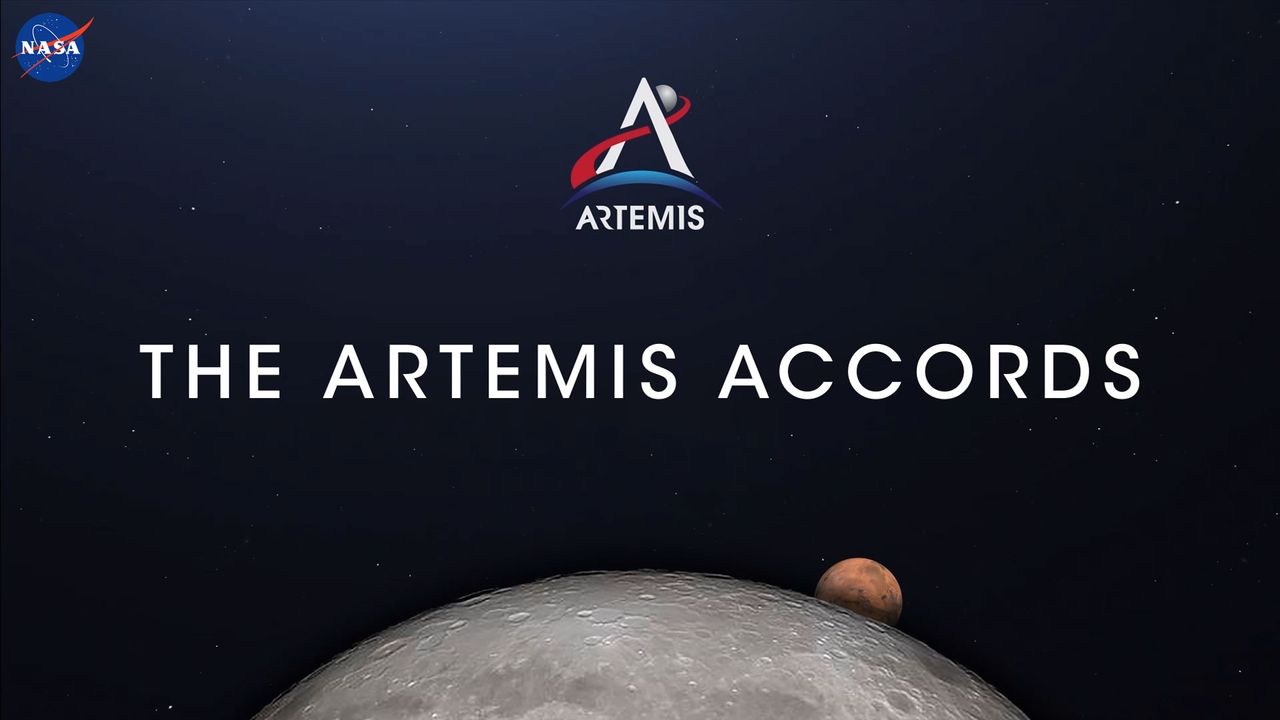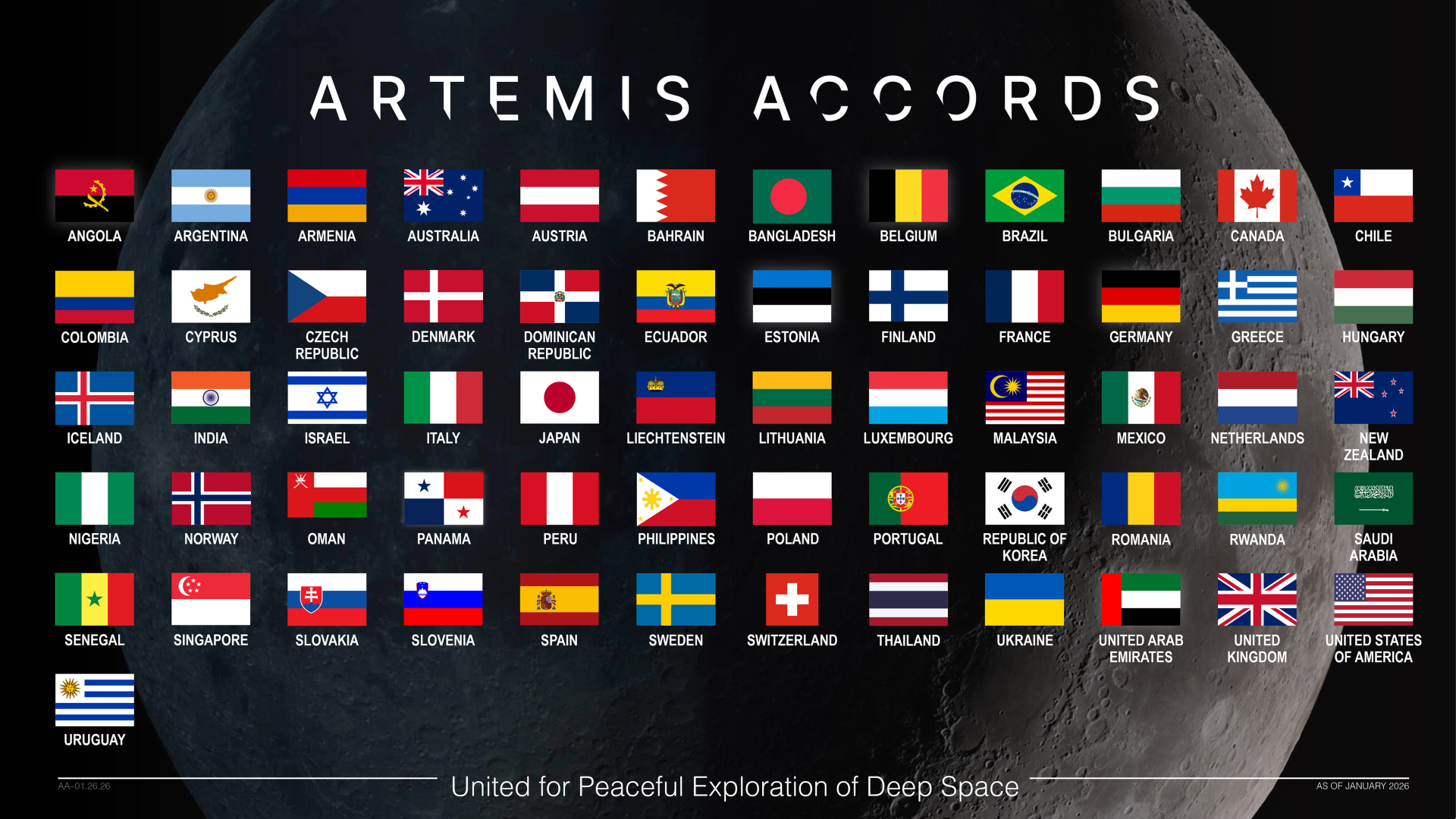
The Artemis Accords are a set of statements that set out common principles, guidelines, and best practices that apply to the safe exploration of the moon and eventually beyond as humanity extends the duration of space missions and its reach to Mars.
While NASA is leading the Artemis program, which aims to kick start a new era of space exploration and put the first woman and person of color on the moon in 2024, international partnerships with numerous countries and private companies are vital to its success.
Initiated by NASA the aim of the accords is to establish a common set of principles to ensure missions that fall under the Artemis mission umbrella are undertaken responsibly.
Related: The 10 greatest images from NASA's Artemis 1 moon mission
Co-led by NASA and the U.S. Department of State, the Artemis Accords are signed at a national level rather than on an organizational level, and countries that sign the accord do so voluntarily.
"Artemis will be the broadest and most diverse international human space exploration program in history, and the Artemis Accords are the vehicle that will establish this singular global coalition," NASA Administrator Jim Bridenstine said in 2020 when the Accords were founded. "With today's signing, we are uniting with our partners to explore the moon and are establishing vital principles that will create a safe, peaceful, and prosperous future in space for all of humanity to enjoy."
Origins of the Artemis Accords

One of the key principles of the Artemis Accords is to affirm the importance of countries complying with 1967's Outer Space Treaty (or the Treaty on Principles Governing the Activities of States in the Exploration and Use of Outer Space, Including the moon and Other Celestial Bodies to give it its full title).
Additionally, the accords affirm the importance of the Rescue and Return Agreement opened in 1968, which emphasizes the responsibility of nations to safely return astronauts and equipment to Earth and further space-related policies such as 1972's Liability Convention and 1975's Registration Convention.
The Artemis Accords were first launched and signed by eight nations in October 2020, with representatives of its signatory nations meeting in person for the first time at the International Astronautical Congress in Paris on September 19, 2022.
In terms of scope, the accords relate to activities in orbit, on the surface, and in the subsurface of the moon, Mars, comets, and asteroids. It also covers the stable orbital points known as the Lagrangian points for the Earth-moon system and is applied to objects in transit between these celestial bodies and locations.
What do the Artemis Accords say?
In the Artemis Accords document, NASA lays out the key principles of the Artemis Accords as follows:
- Peaceful Exploration of space: Nations agree that all activities conducted under the Artemis program must be carried out for peaceful purposes in accordance with international law.
- Transparency: Signatory nations should conduct their activities in a transparent way in the hope this prevents both confusion and conflict. This also extends to signatories sharing scientific information with the public and the international scientific community on a good-faith basis. Signatories should apply this even to competing projects and are expected to coordinate the release of research and papers with each other. The accords state: "Artemis Accords signatories commit to the public release of scientific information, allowing the whole world to join us on the Artemis journey."
- Interoperability: The accords say that nations participating in the Artemis program should aim to develop and provide support for systems that can work in conjunction with existing infrastructure, hopefully enhancing both the safety of space operations and the sustainability of these missions.
- Emergency Assistance: Nations signing the Artemis Accords are committed to assisting astronauts and personnel in outer space who are in distress.
- Registration of Space Objects: Nations participating in Artemis should determine which of them should register any relevant space object.
- Preserving Heritage: Artemis Accords signatories have committed to preserving humanity's outer space heritage. This includes sites with historic significance such as human or robotic landing sites, artifacts, spacecraft, and other evidence of activity on other celestial bodies.
- Space Resources: The accord signatories affirm that extracting and utilizing space resources from the celestial bodies listed above is vital to supporting safe and sustainable space exploration. They also commit to informing the U.N. Secretary General, the public, and the scientific community of space resource extraction activities.
- Deconfliction of Activities: The Artemis Accords nations are committed to preventing harmful interference and exercising the principle of due regard. This also covers the establishment of so-called "safety zones" with areas that can be established between countries and which can be ended when relevant operations cease.
- Orbital Debris: Artemis Accords countries are committed to planning for the safe timely and efficient disposal of debris as part of the mission planning process. Signatories of the accords also agree that they should limit the generation of new long-lived or harmful debris. This includes the safe disposal of space structures in the post-operation phase of missions
Who has signed the Artemis accords?

At the time of writing, 61 countries have signed the Artemis Accords including the U.S., the U.K., Japan, Italy, Canada, and Brazil.
As of Oct. 28, 2025, the nations signed up to the Artemis Accords are as follows (in alphabetical order):
- Angola
- Argentina
- Armenia
- Australia
- Austria
- Bahrain
- Bangladesh
- Belgium
- Brazil
- Bulgaria
- Canada
- Chile
- Columbia
- Cyprus
- Czech Republic
- Denmark
- Dominican Republic
- Ecuador
- Estonia
- Finland
- France
- Germany
- Greece
- Hungary
- Iceland
- India
- Israel
- Italy
- Japan
- Lichtenstein
- Lithuania
- Luxemburg
- Malaysia
- Mexico
- Netherlands
- New Zealand
- Nigeria
- Norway
- Oman
- Panama
- Peru
- Philippines
- Poland
- Portugal
- Republic of Korea
- Romania
- Rwanda
- Saudi Arabia
- Senegal
- Singapore
- Slovakia
- Slovenia
- Spain
- Sweden
- Switzerland
- Thailand
- Ukraine
- United Arab Emirates
- United Kingdom
- United States of America
- Uruguay
Additional resources
The Artemis mission represents humanity's next exciting steps in space exploration with an emphasis on diversity. To read how the mission will proceed visit the NASA Artemis site. Artemis is in many ways the natural successor to the Apollo program which also carried humanity to the moon. Learn more about the Apollo missions with these resources from NASA. here.
Bibliography
The Artemis Accords, [Accessed 01/03/23], [https://www.nasa.gov/specials/artemis-accords/img/Artemis-Accords-signed-13Oct2020.pdf]
The Artemis Accords, Artemis NASA, [Accessed 01/03/23], [https://www.nasa.gov/specials/artemis-accords/index.html
The Artemis Accords, Gov.co.uk, [Accessed 01/03/23], https://www.gov.uk/government/publications/the-artemis-accords
Gateway MoU and Artemis Accords — FAQs, ESA, [Accessed 01/03/23], https://www.esa.int/Science_Exploration/Human_and_Robotic_Exploration/Gateway_MoU_and_Artemis_Accords_FAQs
First Meeting of Artemis Accords Signatories, U.S. Department of State, [Accessed 01/03/23], [https://www.state.gov/first-meeting-of-artemis-accords-signatories]







